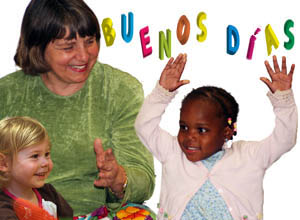
Benefits of a Second Language
Why learn a second language? You already know some of the benefits of knowing a second language, including:
- Travel and cultural opportunities
- Admission to better universities
- Increased employment opportunities
- General life enrichment
However, you might not be aware of some of the profound affects that early language exposure can have on the developing brain of a child.
How learning a second language affects the young brain
It has long been known that there is a strong link between language, music and other developmental skills, such as math and logical thinking. Children who are exposed to music and/or language training show measurable improvements in other cognitive skills. Researchers believe that early language exposure actually increases the size and power of a child's brain!
Current Brain Research
In some regards an infant's brain is like a blank slate. Exposing your child to a second language at an early age can actually change the way your child's brain is structured by forming connections that otherwise would not be formed. These connections seem to be not only necessary for learning language, but are beneficial in many other academic areas: study after study shows that students who have studied a second language do better in other seemingly unrelated areas such as mathematics and logic.

The Earlier the Better
Research proves that the best time to learn a foreign language is in infancy - the sooner the better. According to neurobiologists, a newborn’s brain is like a new computer waiting to be programmed. Some of the brain’s basic functions, such as breathing and heart beat are fixed in place while baby is still in the womb. But trillions of other connections in the brain are just waiting to be made, or programmed in, during the first years of life. Some of these early connections govern such skills as the ability to see and distinguish faces and objects, to master basic motor skills. Others are specifically waiting there to learn languages. But these connections will only develop to the extent to which they are used, and if not developed when the child is young, the "window of opportunity" to develop these connections will quickly fade, until by about age 8 or 10, it is lost.
A few samples of what researcher say:
"Third, fourth, and fifth graders studying languages showed significantly higher scores on the 1985 Basic Skills Language Arts Test than a similar group of nonparticipants. In addition, by fifth grade the math scores of language students were also higher than those of nonlanguage students."
Rafferty, E.A. (1986)
"These <bilingual> children score well above anticipated national norms in both reading and mathematics and higher than the average of all magnet school participants."
Andrade, C. et al. (1989)
"Students who speak more than one language perform higher than their monolingual counterparts on tests of academic achievement, cognitive flexibility, and creativity"
(Moran & Hakuta, 1995; Bialystok & Hakuta, 1991; Rafferty, 1986; Hakuta & Diaz, 1985; Saxe, 1983, others
"Research suggests that students who receive second language instruction are more creative and better at solving complex problems than those who do not."
Bamford and Mizokawa, (1991)
"People who are bilingual have an advantage over the rest of us, and not just in terms of communication skills. The bilingual brain develops more densely, giving it an advantage in various abilities and skills, according to new research...brain imaging showed that bilingual speakers had denser gray matter compared with monolingual participants."
Miranda Hitti -WebMD Medical News (Oct. 13, 2004)
"The difference was especially significant in the brain's left side -- an area known to control language and communication skills. The right hemisphere of bilingual speakers also showed a similar trend.
As in the first test, increases in gray matter density in the brain's left region were linked to age at which a person became bilingual. The earliest second language learners had the densest gray matter in that part of the brain.
Our findings suggest that the structure of the human brain is altered by the experience of acquiring a second language."
Mechelli, A. Nature, (October 2004)
"The power to learn language is so great in the young child that it doesn’t seem to matter how many languages you throw their way. They can learn as many as you allow them to hear systematically and regularly at the same time."
Susan Curtis, linguistics professor at the University of California, Los Angeles.
"The researchers say that although language is thought to be mediated by functional changes in the brain, they show that being bilingual structurally changes the brain. Their study shows the effect was strongest in people who had learned a second language before age 5.
Those who had learned <a second language> at a young age had greater proficiency in reading, writing, talking, and understanding English speech."
(Mechelli, A. Nature, October 2004)
"An obvious advantage of knowing more than one language is having expanded access to people and resources. Individuals who speak and read more than one language have the ability to communicate with more people, read more literature, and benefit more fully from travel to other countries. Introducing students to alternative ways of expressing themselves and to different cultures gives greater depth to their understanding of human experience by fostering an appreciation for the customs and achievements of people beyond their own communities. Ultimately, knowing a second language can also give people a competitive advantage in the work force by opening up additional job opportunities"
(Villano, 1996)

